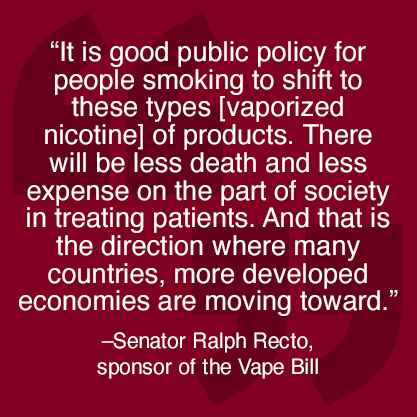The proposed Vape Bill moved closer to becoming a law after the Senate approved it on second reading—a development that consumer advocacy groups said will help the Philippines dramatically reduce smoking rate and improve public health.
An overwhelming majority of the Senate approved on second reading Senate Bill No. 2239, or the Vaporized Nicotine Product bill, with very strict restrictions to ensure minors will not have access to these products and adult smokers are offered a less harmful alternative to cigarettes.
In a voice vote with only one objection, the chamber passed its own version of the bill which was already approved on third and final reading by the House of Representatives.
The Senate approval of SB 2239 is a victory for public health and the beginning of the end of smoking in the Philippines, according to consumer advocacy groups. The Department of Health estimates that there are one million Filipino users of e-cigarettes and heated tobacco products who quit smoking already, but there are still 17 million Filipinos who still smoke combustible cigarettes.

In endorsing SB 2239, Senator Ralph Recto, the sponsor of the bill, said, “It is good public policy for people smoking to shift to these types [vaporized nicotine] of products. There will be less death and less expense on the part of society in treating patients. And that is the direction where many countries, more developed economies are moving toward,” said Recto.
SB 2239 aims to regulate the importation, manufacture, sale, packaging, distribution, use and consumption of e-cigarettes and heated tobacco products (HTPs) using internationally-accepted standards to protect citizens from the hazards of regulated, unregulated and substandard products.
Recto said SB 2239 will serve public health especially if the vaporized nicotine products are more accessible to adult smokers. “Why? Because, it is less harmful. Can you imagine how many lives would have been saved if instead of smoking, they shifted to these types of products?” he said.
The measure has strong provisions that ensure minors will not have access to non-combustible alternatives and that only 18 years old and above are allowed to purchase and use them, the same age restriction imposed on cigarettes.
Consumer, advocacy and industry groups Quit for Good, Nicotine Consumers Union of the Philippines (NCUP), Philippine E-cigarette Industry Association (PECIA) and Vaper AKO commended the Senate for upholding the rights and welfare of the 17 million Filipino smokers.
Anton Israel, president of NCUP said: “We commend the Senate for passing the vape bill on second reading which brings it closer to becoming a law. We laud Senator Ralph Recto, the sponsor of the bill, for acknowledging and defending the rights of Filipino consumers to choose a better form of nicotine consumption.”
“Once enacted into law, this measure is expected to reduce smoking rate in the Philippines, as it will provide Filipino smokers a way out of smoking through less harmful alternatives such as e-cigarettes and heated tobacco products,” he added.
“I thank our senators for approving the vaping bill which aims to regulate the use of smoke-free nicotine products and ensure that minors will not have access to them. The implementation of the bill will cut down the black market and enforce compliance by manufacturers and traders of vapor products and HTPs with international standards,” said Dr. Lorenzo Mata, president of Quit for Good.
“The approval of the vaping bill will hopefully inform more smokers of the deadly chemicals in smoking and encourage them to seek less harmful alternatives, if they could not just simply quit,” said Dr. Mata.
Vaping groups have launched an active campaign on social media to gather massive support for SB 2239. “We at PECIA thank the Senate for listening to the voice of Filipino consumers who have organized #yestoSB2239 campaign on social media. We eagerly await the final approval by the Senate and the bi-cameral conference committee,” said Joey Dulay, president of PECIA.
“We will continue to show our support for the bill until it is passed and signed into law that will make the Philippines one of the first countries to acknowledge the role of tobacco harm reduction as a public health policy to address smoking,” said Dulay.
The House of Representatives approved on May 25, 2021 its version, House Bill 9007 or the proposed Non-Combustible Nicotine Delivery Systems Regulation Act which recognizes tobacco harm reduction as a public health strategy. HB 9007, a consolidation of 23 bills authored by 154 representatives, seeks to establish a clear and effective law and regulation, including product standards to govern vaporized nicotine products (VNPs) which are considered non-combustible alternatives to cigarettes.
HB 9007 expressly declares as a policy of the State “to consider harm reduction measures as public health strategy by ensuring that non-combustible alternatives to cigarettes are properly regulated.”
Joaqui Gallardo, spokesman of consumer group Vaper AKO, said that with the enactment of SB 2239, a big portion of the 17 million Filipino smokers would likely switch to e-cigarettes and HTPs which were scientifically found to be 95-percent less harmful than combustible tobacco. He said nearly a million former smokers have already switched to these smoke-free products, and more are expected to follow suit, once a vaping law is implemented.
“We at Vaper Ako laud the Senate for recognizing the rights of more than 1 million Filipino vapers and users of heated tobacco products who have found a better way of consuming nicotine, which is a food-grade substance, by the way. These electronic products provide a better way of delivering nicotine, without combustion or the one that produces the harmful elements in tar. With these innovative products, the risks are much lower for nicotine consumers,” said Gallardo.
More than 80 countries, including the Philippines, had no specific laws yet regulating vaporized nicotine products as of 2020. SB 2239 and HB 9007 aim to fill the gap in local regulation amid the proliferation of sale and use of HTPs and vaping products among Filipino consumers.
In 2018, Public Health England maintained that vaping is 95-percent less harmful than tobacco and that it would be tragic if thousands of smokers who could quit with the help of an e-cigarette are being put off due to false fears about safety.
Cardiologist Rafael Castillo, a fellow of the Philippine College of Physicians, Philippine College of Cardiology and European Society of Cardiology, said the current decline in smoking rate in the Philippines was not fast enough. “We know there’s no quick fix to it, but a pragmatic and aggressive approach to the problem that shows some promise in mitigating the outcomes should be tried. The use of alternative tobacco products and HTPs may be one such approach,” he said.



















